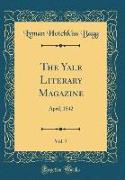- Start
- The Yale Literary Magazine, Vol. 7
The Yale Literary Magazine, Vol. 7
Angebote / Angebote:
Excerpt from The Yale Literary Magazine, Vol. 7: April, 1842One of the first things that meet us as objectionable in the~transcendental theory is, that just so far as there is any thing in it distinct from other systems, it completely sets aside the law of induction, the great principle that has guided all modern investigation, and brought many of the sciences to an almost absolute perfection. For if there be this remote prov ince in the mind - this trans-alpine region, lying beyond the boundaries of general consciousness, cut off from every thing without and every thing within, we surely cannot approach it by following any line of induction. Like Eneas, when he was about to enter the world of shadows, we had need consult some Sybil to guide our wanderings. The transcendentalist, in his mode of forming a philosophical system, goes back two thousand years. He follows a Grecian model. Nor does his theory dif fer materially from some of the notions of the Greek hiloso phers. Plato held that ideas, or (in other words) the fgrms in which things appear, had existed from eternity, and that the creative operation of the Deity consisted simply in forcin crude chaotic matter (which was also eternal) into these idea? Forms. He maintained, moreover, that while the vulgar mind could only hold converse with these material sensible things, yet a chosen few, illumined by the long contemplation of truth, and freed from the slavery of every earthly passion, could come at length to look directly upon these pure ideas - these patterns of things which had existed from eternity. Here is the same pure reason - the same aristocracy of philosophers, to which the modern transcendentalist lays claim. Yet how little real per manent truth is there to be found among all those fine-spun theories of the Grecian schools It was only when they made use of the law of induction, that they discovered any thing of lasting benefit to mankind. Their beautiful hypotheses, that had shone like stars during the night of the world, all vanished at the rising of the sun. Experience has fully shown that the inductive process of reasoning is the only mode that conducts us safely and certainly to the truth. We must be content to sit down and watch the phenomena of nature, and learn her se crets only as she reveals them to us in her daily operations. But if there be in the mind this pure reason, that can look di rectly upon truth, without sensation, or re¿ection, or any inter vening step whatsoever, then it is manifest that so far the law of induction is not only unnecessary, but inapplicable. Every claim that infringes upon a law under which such splendid re sults have been obtained, should at least arouse our distrust, for if the results of the inductive principle are not true, then must we despair of ever attaining truth, and sink back into utter igno rance or doubt.About the PublisherForgotten Books publishes hundreds of thousands of rare and classic books. Find more at www.forgottenbooks.comThis book is a reproduction of an important historical work. Forgotten Books uses state-of-the-art technology to digitally reconstruct the work, preserving the original format whilst repairing imperfections present in the aged copy. In rare cases, an imperfection in the original, such as a blemish or missing page, may be replicated in our edition. We do, however, repair the vast majority of imperfections successfully, any imperfections that remain are intentionally left to preserve the state of such historical works.
Folgt in ca. 10 Arbeitstagen

